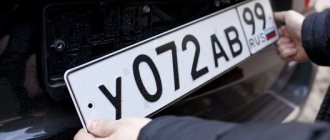Back in 2013, it became possible to sell a car without deregistering it throughout Russia. The responsibility for re-registration of the car now falls entirely on the buyer.
But the former owner of the car, after a successful purchase and sale transaction, may run into problems if the new owner of the car neglected to re-register. These may simply be fines, or there may also be proceedings with law enforcement agencies if the car has become an unwitting participant in a crime.
Then what should you do if you sold the car, but for some reason the buyer did not re-register it?
Reasons why the buyer might not re-register the car in his name
The fact of purchasing a car is recorded in the sales contract. But if the car was not deregistered before the sale, for law enforcement agencies it is still registered with the old owner until the new owner registers the purchased vehicle in his name. And there are several reasons why the new owner did not do this.
First of all, this is a deliberate deception of the past owner. Yes, vehicle registration is an obligation, failure to fulfill which on time is punishable by a fine of 500-800 rubles in accordance with Article 12.1 of the Code of Administrative Offenses of the Russian Federation.
But in fact, the previous owner of the car, after receiving the money and concluding the deal, releases the buyer on his word of honor that he will arrange everything in the next 10 days (this is how much is given by law for registering the car), because the law does not oblige the car to be re-registered in his name immediately after it purchases, and even with the personal presence of the previous owner.
This is what attackers take advantage of. The motivation in most of these cases is simple - not to pay fines and transport taxes. Or maybe even to commit a serious crime in order to set the police on the wrong trail.
Another reason may be that the new owner of the car simply did not have time to deregister the vehicle. Due to forgetfulness, busyness, family problems. You may not be able to make it in time when moving a car from region to region. One way or another, there may be a lot of factors, but they are summarized by some misunderstanding that does not carry malicious intent.
It may be that the basis for not registering is the car itself. The process of registering a car itself involves drawing up a vehicle inspection report, which records the accuracy of information about the car, such as the compliance of the license plates on the car units with the declared ones.
When deregistering, this check is also carried out, but if there was no deregistration, all these checks, including permission to make modifications to the car, as well as documents for additional equipment, for example, gas equipment, are on the shoulders of the new owner. If inconsistencies are found, the registration process may be delayed.
Is it possible to avoid what we want to avoid?
It all depends on why exactly you want to transfer the car to another person. Let's look at the most common cases.
If the car is a loan?
Then you have no right to alienate the car at all, but only if we are talking about a car loan - that is, if the car is collateral.
Thus, if you do not pay the loan and by re-registering the car you want to avoid the fact that it will simply be taken away from you, then you will not be able to do this. Let's start with the fact that the bank cannot simply take away its collateral - only by a court decision. We discussed this subtlety separately in a special article. And, if there is a court decision, then with a high degree of probability there will be a recognition of your purchase and sale agreement as void, and an obligation to return the car to the bank.
What if the car can be repossessed for debt?
This is a more general reason for re-registration. When, for example, it is not the bank that requires collateral, but the car can be sold to pay off your other debts by bailiffs.
Here, too, the contract may be considered fictitious. If the court sees your fraud - that you deliberately got rid of property in order not to pay debts, then the deal will be canceled by the court.
If the car is used by another owner?
Your car is driven mostly by another driver, and you continue to receive fines from traffic police cameras and pay transport tax? Then re-registering the car to this driver would be reasonable, but, unfortunately, again impossible due to restrictions in the 2021 legislation.
The solution is simple! If it is a stranger, let him buy from you and become the owner of the car. If you are a relative, you can give it to him. In both cases, you will save yourself from fines, taxes and other risks.
To write off traffic fines or taxes?
Many car owners, having retired or disabled relatives, friends or acquaintances, prefer to re-register the car in their name for one or all of the following purposes:
- some categories of citizens have benefits on the transport tax rate - that is, by re-registering a car, for example, as a veteran’s, you can pay less to the state,
- some drivers believe that in this way they can avoid fines,
- Still others need to register a car for a disabled person in order to have the right to park in the parking spaces reserved for them.
So, the first and third options may work - however, all the risks remaining due to the fact that the owner will be another person remain. Therefore, it is highly advisable to re-register the car not in the name of a stranger (even your best friend’s grandmother or second cousin’s great-grandfather), but in the name of your closest relative.
But it will not be possible to avoid fines - no benefits are provided for them for certain categories of citizens.
Expert opinion
Yuri Panchenko
Driving instructor, human rights activist, author of books. 10 years of experience.
Re-registering a car to another owner in order to evade taxes or to prevent the car from being repossessed for debt is always potentially dangerous. In the event of the death of the fictitious owner, a purchase and sale agreement is deliberately drawn up so that the real owner can return the car to himself at any time. This agreement is completely completed and signed, but only the date is missing.
It would seem that it would be easier for the real owner to enter the date at any time and return the car? But it doesn't always work. For example, if the fictitious owner was at that time in a state of insanity, then it would not be difficult for his relatives to recognize the contract as void and keep the car.
Ask a Question
What does this situation mean for the former owner of the car?
The seller is not obliged to control the re-registration of the vehicle.
Most likely, the former owner will find out that the car has not yet been registered with the traffic police when he receives “chain letters” in the mail (read about how to check the car’s registration yourself here). A number of violations, such as exceeding or driving in the lane for route vehicles, are recorded automatically. This means that the notice of payment of the fine will automatically come to the owner who has already said goodbye to the car.
There is no administrative liability for the sale of a car that has not been deregistered; this is logical; such a rule was introduced specifically to simplify the sale, and not to punish for it.
How much does it cost? State duties
So, if you still decide to re-register the car to another person, then we have one more reason to dissuade you (we don’t do this on purpose, of course, but alas, these are the facts of the law!).
It is expensive, also because you will have to sell or donate the car. And consists of the following expense items:
- state duty for replacing the registration certificate – 500 rubles,
- state duty for changes to the vehicle title is 350 rubles (if you do not have a vehicle passport or there is no space in it, then the cost of producing a duplicate will be 800 rubles),
- The biggest expense is MTPL insurance; its cost varies greatly depending on a number of factors, and can average from 3 to 10 thousand rubles.
But that's not all the expenses. Situationally, the following may occur.
The most expensive thing is MTPL insurance
Above we have indicated its approximate price. The policy is mandatory for registering the car with the new owner.
But if you have a long enough time left to use your car (for example, you issued an MTPL on January 10, 2021, and on January 20 you already re-registered the car to another person), then you can return part of the money.
The calculation here is approximately this: the percentage of the unused OSAGO period from the full cost of insurance (paid by you) minus the fixed 23% - these are the expenses of the insurance company itself, which are not refundable.
Subtlety with license plates
Even if you have cars with license plates, the inspector of the registration department of the traffic police can force you to change them in one case - if the registration region of the very other person for whom you are re-registering the car is different from yours. Such new rules were introduced not so long ago.
And also, even if your regions of residence coincide, the license plates must be in perfect condition for re-registration, so you may have to make a duplicate of them (about 800-1500 rubles additional).
What to do if this happens?
This problem is not one that cannot be dealt with without special education. The strategy for what the former owner (seller) of the car should do if the buyer did not deregister the car and did not re-register it is described in order below.
Notification of the current owner of the vehicle
If you find fines in your name, you need to contact the real owner. If contact occurs, you need to do two things:
- The violation occurred after the sale, which means requiring money to pay a fine. As evidence – the date recorded on the notification form.
- Make sure you have an STS, a vehicle registration certificate, with genuine information about the car and real passport details of the new owner.
In the best case, there is an STS, and the parties have agreed on how the received fines will be paid. In the opposite case, there is no evidence that the car is registered, and persuasion to do so does not work.
Contacting the traffic police
So, the car was sold, but the owner did not re-register it in his name and did not register it with the traffic police after the vehicle sale transaction. The mandatory registration deadlines have passed, there is no contact with the new owner, as well as evidence that he has a re-registered STS, but there is a fine. The following actions have a clear order:
- You can contact the nearest traffic police department. This must be done 10 days after the sale of the car.
- The registration department needs to make sure that re-registration has not occurred.
- Write an application to terminate the registration of the vehicle due to the sale and failure to re-register it within the legal time frame by the new owner. The application is accompanied by a purchase and sale agreement or any other confirmation of the transaction.
After this, the car will no longer be registered with the old owner, which means there should be no new problems.
Termination of an agreement
In the future, it is possible to terminate the purchase and sale agreement if the old owner decides for some reason to return the car. For example, for the reason that the payment to the seller is made in installments and the former owner lost confidence in the buyer’s honesty, and therefore there was a desire to return the car. This is done through an agreement to terminate the purchase and sale agreement. There are two options for the development of events:
- everything happens by mutual consent;
- through the court.
For the court, you need a full package of documents and evidence of your case:
- A claim that sets out the requirements for termination of the vehicle purchase and sale agreement and the reasons for this. The claim is sent by registered mail with acknowledgment of receipt.
- Proof of the claim being sent to the new owner.
- Statement of claim and receipt for sending a copy of the claim to the new owner of the car. The claim requires the return of the vehicle by the defendant, payment of a fine, as well as the recovery of legal costs. This is done in accordance with the Civil Code (Articles 450, 469, 470).
- PrEP.
During court proceedings, you should not neglect the services of lawyers; payment for their work can still be included in the total amount of legal costs.
Vehicle registration rules
Re-registration of a vehicle seems to many to be a complicated procedure, so they are in no hurry to make an appointment at the nearest branch, postponing everything until later. As a result, this leads to violation of the deadlines established by law. It itself is not complicated and is performed according to the following algorithm:
- Collection and verification of documents. To contact the territorial authority, you will need a passport of a citizen of the Russian Federation, a vehicle certificate, a diagnostic card and a PTS.
- Registration of an insurance policy for the buyer. This is done in any chosen company at personal discretion.
- Payment of state duty. This can be done on the official Gosuslugi portal, which allows you to additionally receive a discount, or at the bank’s cash desk.
- Submitting an application. It is drawn up on a special form and filled out in person. All documents are attached to it.
- Checking the car. The specialist checks the data in the vehicle title with the actual data; for this purpose, the vehicle is inspected at a special site. The procedure takes about 10 minutes. If there is illegal tuning or tinting, it is better to remove them before checking, as this will be the reason for refusal to re-register.
- Obtaining a new certificate. If license plates have been changed, they will be issued at this stage. It is important to check the correct spelling of the last name and all entered data.
It is important to know! If, after selling the car, the new owner does not register the car, he bears administrative liability in the form of a fine. Today it is 1500 rubles. Driving a vehicle that is not registered in accordance with the established procedure implies a sanction of 5,000 rubles.
Is it possible to appeal fines and taxes that came to the former owner?
To appeal fines, you must submit a corresponding application to the traffic police. You can do this through their website; within no more than 10 days after the fine is issued, a complaint is written to the head of the traffic police about disagreement with the decision made.
You must attach a document confirming that the car was sold at the time of the violation. If the allotted deadlines have passed, you can file a lawsuit, but it is advisable to do this if the fine is large. Then it is logical to use the court to ensure that the real offender pays for them.
In court proceedings, as a rule, the fact of trying to reach an agreement on your own is important. For this purpose, a pre-trial claim is also usually drawn up in the form of a registered letter addressed to the name and address of the new owner. The complaint must describe specific requirements for the defendant. The letter is sent, in a couple of days you need to come to the post office for notification of receipt of the letter.
In principle, the mechanism for filing a claim is similar to the process described above for terminating a vehicle purchase and sale agreement. Competent preparation of all papers and the assistance of a qualified lawyer increases the chances of winning in court.
Of course, there is no lower limit for which one can sue. The question is whether it is worth the time and effort to get a small amount of money. A small fine will be, in some way, a lesson in financial and legal literacy.
Transport tax may come even if the new owner is honest and re-registered everything on time. Then the fault is due to the traffic police, which did not submit information to the tax office on time, or the tax office itself, which made a mistake.
Then you need to write an application for tax recalculation, attaching evidence of re-registration of the car with the traffic police.
In this situation, it will be just fine if both parties immediately found a common language - there is no need to waste time and fray your nerves by appealing to the traffic police, courts and other authorities. But when there is no contact from the new owner of the car and all problems need to be resolved by the seller. But there is no need to despair in such a situation, because the law is on the side of the former owner , and to successfully solve the problem it is enough to use to the fullest all the possibilities of the legislative and legal framework of the state.
Now you know what to do if the car was sold, but was not deregistered, and also why the car might not have been registered after the sale.
Is it possible to re-register without selling?
Yes. You don't have to sell the car, but donate it. But then the new owner will be required to pay income tax in the amount of 13% of the cost of the car. When he goes to the traffic police to re-register it in his name, the data from the department will go to the tax office. She will subsequently issue a demand for payment.
But persons are exempt from paying this tax if they are your close relatives: wife, husband, father, mother, brother or sister and others; their full list is determined by Article 217 of the Tax Code of the Russian Federation.
OSAGO when registering a car
If a car is sold or donated, the insurance will have to be changed (Article 15 No. 283-FZ). This means that the buyer must purchase a policy or be included in the current MTPL, if it is possible to agree on this with the seller. Otherwise, you will not be able to drive the car legally.
When concluding a transaction, you will need to contact the insurance company. Its representatives will explain all the features of the procedure. You need to understand that the terms car owner and policyholder are not identical. The owner is the owner of the insured car. The role of the policyholder is a citizen who has entered into an agreement with the insurer. According to the law, a vehicle can have several owners at once. The insured is always one person.
Re-registration of a car without deregistration through State Services
In 2021, the law allows citizens to re-register a car without deregistration through the State Services portal. Persons with a verified account will be able to use the method. It is recommended to prepare a package of documents in advance. You will need the same papers that are required when applying in person to the traffic police. The procedure for re-registering a car to another owner without deregistration is as follows:
- A citizen enters the portal and completes the authorization procedure. To do this, you will need to enter your username and password.
- Among the available services, you need to select the transport and driving category. Then you need to click on vehicle registration.
- Click on the link to complete documents when purchasing. In the list that appears, you need to click on the vehicle registration item. Then all that remains is to give the system the command to get class=”aligncenter” width=”895″ height=”493″|fcw3qayjh5a| src=”https://zakon-voditel.ru/wp-content/uploads/2019/02/Registratsiya-avtomototransportnogo-sredstva-v-Gosavtoinspektsii-GosUslugi.png” class=”aligncenter” width=”881″ height=” 516″|fcw3qayjh5a| src=»https://zakon-voditel.ru/wp-content/uploads/2019/02/Poluchit-uslugi-cherez-GosUslugi.png» class=»aligncenter» width=»1152″ height=»430″[/ img]
- The citizen will receive an online questionnaire. You need to enter information about the new owner and the car. You will need to provide passport details, registration information about the owner of the car and its characteristics. Additionally, a convenient date for a visit to the traffic police is indicated.
- Submit your application. It will be accepted for processing. When the procedure is completed, the citizen will have to pay a state fee.
- You will need to visit the state traffic inspector at the appointed time. You need to have a package of documents with you.
Registration of a power of attorney to re-register a car to another owner
If a citizen cannot complete the registration procedure independently, a power of attorney is drawn up. It does not need to be notarized. This rule is regulated by Articles 185-189 of the Civil Code of the Russian Federation. The authorized representative will have to follow the standard procedure for re-registration of the car. However, the package of documents must include a passport and power of attorney. The document must be drawn up in accordance with established rules. The form of the document is not fixed by law. It is recommended to use a ready-made sample. You can download the power of attorney to register your car here.
Re-registration of a car to another owner by inheritance
Having received a certificate of the right to inheritance, a citizen is obliged to begin the re-registration procedure. It is also no different from other situations. You can submit an application to the traffic police through government services or during a personal visit. Only the package of documents is subject to change. A certificate is used as a document confirming the ownership of a car. You must re-register the car within 10 days. The period is calculated from the moment of receipt of documentation on entry into inheritance.
What happens after registration is terminated
If the old owner decides to deregister the car due to its loss, he needs to submit a package of documents. After accepting the application, the traffic police officer releases the owner from liability. The numbers are entered into the search database.
The old owner is no longer required to pay taxes and penalties. However, all fines that came earlier will have to be paid. It is possible to challenge the decision in court. But the chances of winning the case are slim. Therefore, it is worth making payments yourself.
Of course, if the new owner has been in an accident or received a large fine, it is necessary to prove his non-involvement as soon as possible.
You should not be afraid that an unscrupulous seller will want to return the car without returning the money for it. The search is not announced in order to find the car, but with the intention of finding the new owner and obliging him to fulfill his civil obligation. Fraudulent actions involving fictitious vehicle returns will not work.
After the car, deregistered due to its loss, is found and the new owner is identified, the license plates are confiscated and the vehicle is sent to a fine parking lot. Now you need to properly fill out the documents and pay fines, after which the car and license plates will be returned to the owner.
If the car has not been seized, then it cannot be used until the obligations are fully fulfilled. However, one day is given to transport the car to the parking lot. During this time, the owner is obliged to assign the car to a place of further stay.
The right to sell, donate, inherit a car, partially or completely dismantle it, and dispose of it remains with the owner. But you can’t transport it on your own. You can use a tow truck.
Restoring a canceled vehicle registration is quite problematic. However, it is entirely possible to file a lawsuit. But not all cases are resolved in favor of the owner. It is better to sell the car and buy a new one or simply follow the rules established by law.










